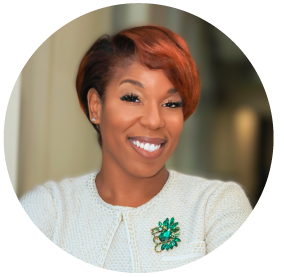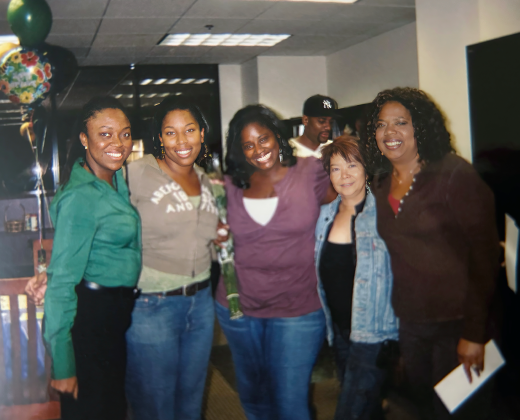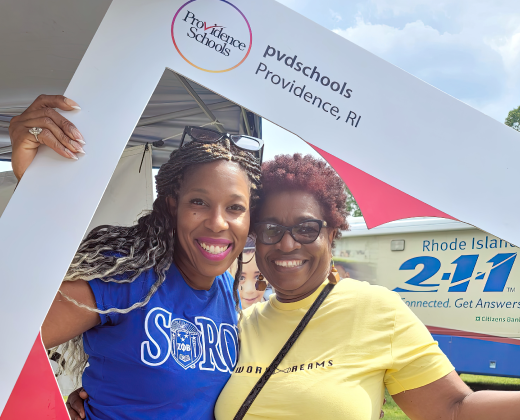Dr. Barbara Mullen is on a trajectory of influence.
This rookie superintendent has already blazed trails with her unique brand of impact and authenticity.

At just 11 years old, Dr. Barbara Mullen marched on the California capitol to protest a ban on affirmative action for the state’s universities and public jobs. She still remembers the sea of other young faces on the capitol steps in Sacramento. It was her parents—both of whom were educators and advocates for public education—who taught her to use her voice for change. “When you grow up with parents like mine, you know immediately when you’re doing things that make a difference,” Mullen tells us. So she set out to do just that.
Now entering her first superintendency, Mullen is a leader whose impact is already far-reaching. In fact, we’ve had the opportunity to speak with Dr. Mullen on several separate occasions during her time in various change-making roles. We were quickly impressed by her authentic and passionate approach to serving students—and her candid take on navigating the bureaucracy of public education to make lasting change.
As someone who has held leadership positions in nearly every corner of the United States, Mullen’s journey hasn’t been a consistent climb so much as a series of courageous leaps. “The path to the superintendency doesn’t always have to be a slow burn,” she tells us. “That’s just not how I roll. If you train for a marathon, you have to do hill sprints—it can’t all be long distance. Short, intense spurts build your stamina for endurance, and I had some impactful, meaningful time in some very hard districts.” Mullen also reminds us that she’s only 38 years old. “The millennial supes are here, and we lead a little bit differently,” she says. And though her meteoric rise may seem like a lightspeed journey, Mullen’s trajectory has been charted with strategy, authenticity, and heart.
As she begins her tenure leading New York’s Rush-Henrietta Central School District—home of the Royal Comets—it’s the perfect time to reflect on how Mullen has used her unique voice and activist spirit to influence the lives of countless students and fellow educators across the country. Needless to say, this teacher, author, and self-proclaimed “organizational architect” is more than ready for the next challenge on her cosmic path to making a difference in the world.

From Greenroom to Classroom
It would be easy to assume that the daughter of a college professor and a special education director would go right into education herself. But despite how much her parents have always inspired her, Mullen wanted to go her own way, majoring in communication and media studies at Northern Illinois University. This quickly led her to pursue a unique opportunity—interning at television network BET (Black Entertainment Television) in Los Angeles.
As a public relations intern and, later, a publicity assistant, Mullen did just about everything: assisting in media outreach, managing events, and working closely with BET’s director of communications on budgets, image control, and demographic analysis. She even wrote press copy and assisted with media training. In short, it was an eye-opening experience, and it quickly led Mullen to recognize one of her biggest strengths.
“People wouldn’t dismiss me,” she tells us. “I was coordinating and galvanizing people. The production team, the film team, the talent, you name it—I was bringing all these people together. It was less about my positional authority and more about being a person who’s relatable. People have to want to listen to you because they like you.”
For Mullen, the lesson was clear: She could influence and empower people through her authenticity and positive approach to the work. “The power of persuasion was the first thing I learned as a PR person,” she says. “You’ve got to have that as an aspiring leader, too. I’ve always led with, What needs to get done? Come and do it with me.”
Her time in PR taught her so much, but Mullen soon felt the pull of her family legacy. “I left PR because while I knew communicating and storytelling was my passion, doing it in a commercial space wasn’t,” she tells us. “I had a seed of impact planted in me as a child, and PR simply couldn’t nurture it to grow.”
Could she use her authentic approach to team building and empowerment to be an effective educator like her parents? Mullen was ready to find out. She enrolled in graduate school at Quincy University, studying for a master’s in special education, and was hired to teach in Chicago Public Schools (CPS). There, in one of the country’s largest school districts, she would begin to find her true focus: changing systems to address and redress inequities in public education.
Finding Her Philosophy
Teaching special education quickly gave Mullen insight into how large school systems like CPS truly function—and how they need to grow. “It was really my segue into looking systemwide at equity, because special education services is a districtwide division,” she says. “You look at data, you assess, you evaluate, and you have a team come together. But, still, there can be something missing. Who’s not at the table? What perspective are we missing to see the complete picture?”
Working as a special education teacher in CPS eventually inspired Mullen to use her advocacy skills to grow her impact beyond the walls of a single classroom. “I really began to see this national push for equity expand,” she tells us. “So I pivoted toward building leadership development, thinking about what systems could impact equity—both at the school level and across an entire district.” Around that same time, she enrolled in Capella University’s Ph.D. program for special education leadership.
Ultimately, Mullen’s time at CPS was an invaluable learning experience. “Chicago Public Schools is still one of the best systems that I have ever worked in,” she tells us. “I had so much support, and I was able to learn as much as I wanted about my practice, about instructional leadership, about teaching, about data-driven instruction.”
Working in CPS also led Mullen to establish the three tenets of her professional philosophy: accountability, reliability, and shared vision. “Accountability goes both ways—it means you tell me the truth and you trust me to tell you the truth,” she says. “I show my love to people by being accountable to them, and reliability is a piece of that love. You build trust when you do what you say you’re going to do.”
Mullen credits her time as a special education teacher for showing her the true importance of the third tenet. “Shared vision comes from the special education side—supporting a child takes a whole team of people,” she says. “You have an IEP team, a general ed teacher, a special education teacher, and a building leader committing their resources to a child. You have to have a collaborative spirit as a leader.”

The Pull of Leadership
Eventually, Mullen found her way to Houston, where she helped to open a charter school and led its special education team. “I was there for about a year and a half, but I missed Chicago,” she says. “Chicago was big and political and a little messy, but I could navigate a system that size.” Soon enough, she heard about an open position that would be perfect for her in Houston ISD (HISD)—the largest school district in Texas. “I wanted to be in a bigger system like that again,” she says. She was hired as HISD’s only inclusion specialist but quickly adapted the role to suit the district’s needs. “If I get into a role, it’s not going to be the same when I leave it as it was when I got there,” she says.
In her role, Mullen was responsible for overseeing inclusion practices for the entire district. “I was also responsible for coaching principals, for supporting school support officers [SSOs], and advising network superintendents,” she tells us. “And that’s how I got into Dr. Grenita Lathan’s orbit, which was game-changing for me.”
Lathan, HISD’s chief academic officer, asked Mullen to present to all of her SSOs and principals on inclusive practices. Mullen focused her talks on how inclusion changes instruction, how it’s everyone’s responsibility to identify kids in need, and how to create cultures of inclusion in schools. “I was fresh off finishing my doctorate, which was all about inclusion, and I was passionate,” Mullen says. “So I stomped my way across Houston ISD saying, Inclusion, inclusion, inclusion.”
But it wasn’t just the opportunities Dr. Lathan offered her that changed the game for Mullen. Lathan was also a representation of what was possible. “She was a Black woman in the superintendency, and I had never seen that before,” Mullen explains. “I just never thought that was a thing we did. Seeing her in that role made me feel seen. It made me feel like I could bring my authentic self to my own role—like I could aspire to higher levels of leadership while staying true to who I was as a Black woman.”
Lessons in leadership would abound for Mullen in HISD. She was tasked with creating and implementing the district’s inclusion policy, as well as redesigning special education programs in 10 schools threatened by state takeover. Then, when she was named to the HISD board’s Special Education Ad Hoc Committee, Mullen got an even closer look at the pressures of the superintendency. “There, I was really able to interface with governance team members and translate up to them the practical management side of doing the work,” Mullen says. “Then they could communicate that to their constituents.”
Mullen already had the heart of a leader when she entered the district, but she left it with the experiences of one. “It was so powerful,” she says. “So many of these projects prepared me to see the good, the bad, and the ugly of executive leadership.”
Call It Providence
In January of 2018, Mullen moved her husband and two kids from Houston to Providence, Rhode Island, where she served as director of the Learning Leader Network for a small firm called the Center for Leadership and Educational Equity (CLEE). “I had the opportunity to make magic,” she says. “I was able to build upon a vision that I was so committed to and that grew me so much. When I talk about facilitative leadership and continuous improvement in organizational design—all of that comes out of working under that group.” The first thing Mullen did in this role was secure a grant from the Bill & Melinda Gates Foundation. “We used that to build out continuous improvement to support turnaround in schools,” she says. “So I didn’t get to work in just one district in Rhode Island—I got to work in all of them.”
Mullen’s work in Rhode Island and in her community made such an impact that when Providence Public Schools was taken over by the state in 2019, Rhode Island Commissioner of Education Angélica Infante-Green asked her to serve as the district’s first chief equity and diversity officer. Fortunately, Mullen had already spent two fruitful years in Providence, serving the community in a variety of ways—from leading in her church to working with the local chapter of her sorority. “By the time I became the chief equity officer, I had an army of community people who believed in the work,” she says. “They already trusted my leadership and knew my heart was in it.”
Despite all the community support, Mullen knew she had to use her authentic approach to leadership to make real, lasting change in the district. For years, Providence had been in a state of turnover—leaders coming and going without changing much for the better. “I tried to be the cultural face of transformation,” she tells us. “What does it look like when we say we’re committed? How do we keep pulling levers that illustrate transformation and bring people into the process?”
For Mullen, being impactful also meant using her talents for connection to reach out to others. “I had a lot of learning to do in that role,” she says. “I knew I needed a community.” She formed an alliance with equity leaders in Chicago, Seattle, and other districts around the country who had been doing the work for years. “We exchanged phone numbers and emails and started sharing resources,” she says.
Mullen’s time in Providence focused on the same kind of work she’s always done: addressing and redressing inequities. As Mullen explains it, addressing inequities means inviting our communities to recognize oppressive systems. “It’s the awareness piece,” she tells us. “It’s how we say: Racism exists here. That can be jarring for white people or anyone with privilege across identity lines—but it’s absolutely necessary.” Redressing inequities, then, is the integral next step. “The redress is the call to action,” she says. “We want to go back and see what belief systems we held that we now know need to be better, so we can change them or put resources toward supporting that transformation.”
Change in Providence under Mullen’s leadership came in many different forms, from addressing and redressing the digital equity divide during the pandemic to putting more resources toward school-based mental health. Mullen also implemented a social-emotional learning-based curriculum that centered around community building. “I think of equity as the tide that lifts all boats,” she says.
Despite everything she accomplished for the district, Mullen is quick to give credit to the educators and leaders in Providence she partnered with on this important work. “I’d like to take the accolades, but I would be remiss if I didn’t say it was a team effort,” she tells us. “We can do more together on our worst day than we can do alone on our best day.”

New Horizons
By the time of this publication, Mullen will have just stepped into her first superintendency, and she couldn’t be more excited—or prepared—to lead Rush-Henrietta Central School District. The diverse New York district has had a sharp focus on equity and inclusion for several years, and while it’s a slightly smaller district than she’s used to, Mullen is confident that it’s the perfect place for her and her family. “I’m a Great Lakes girl. That’s where my roots are,” she tells us. “And right now I’m in the thick of mommy mode. I have a 12-year-old and an 8-year-old, and I have no qualms about it—they are my sun, moon, and stars.”
After many years of school turnaround work, Mullen is ready to bring her brand of authentic leadership to a place with all-new challenges. “The thing I’m most excited about is the chance to be thoughtful in ways I couldn’t be before because I was so in the thick of it,” she says. “I know I’m equipped and able to be a teacher, a translator, a designer, and a champion for schools. I truly believe that I can have it all. I can be a mother, and I can be a superintendent. I can be in the community, but I can also have a national perspective. I can be very serious, and I can be very funny. I can work in a bureaucracy and honor the individual. To me, those are all things that are very important to the role, and I needed to be in a district that honors the duality of who I am.”
It’s also not lost on Mullen that she will be Rush-Henrietta’s first Black female superintendent. With just 1% of all superintendents in the country being women of color, Mullen is well aware of the precedent she’s setting. “Black women leaders are coming, and we are bringing everyone with us,” she says. “We need to ensure that we’re creating pipelines that include not just Black women, but Indigenous women, Southeast Asian women, and LGBTQ+ educators.”
Diversity in leadership, after all, helps “ensure that those on the margins are not forgotten,” she says. “Our students’ lives matter—their trans lives, their lives living with disability, their lives as girls or as neurodivergent boys. We have to understand that when we amplify Black voices, we give others permission to raise their voices with us for a more just world.”
Instilled with her parents’ strong sense of justice and influence, Mullen has spent her career impacting the lives of others—a mission she’ll continue in Rush-Henrietta and beyond. With her unwavering dedication to authenticity, Mullen has established herself as a leader who is not only willing to take on new challenges, but who is also devoted to enriching the lives of the educators she leads and the students she serves.
“I am who I am, and I’m not about to hide it,” she says. “I want to be there for every little kid who has their own vibe, who has their own essence, who doesn’t feel represented—not just white and Black or girls and boys, but the nonbinary kids, the queer kids, the multilingual learners, or the kids who just want to sit in a corner and read books. I’m going to walk in with my nose ring and my swagger and show them that you can be yourself, and that being yourself will get you a lot further than being anybody else.”
Originally published as "Trajectory of Influence" in the Spring 2023 issue of SchoolCEO.
Corey Whaley is a writer with SchoolCEO and can be reached at corey@schoolceo.com.
Subscribe below to stay connected with SchoolCEO!

